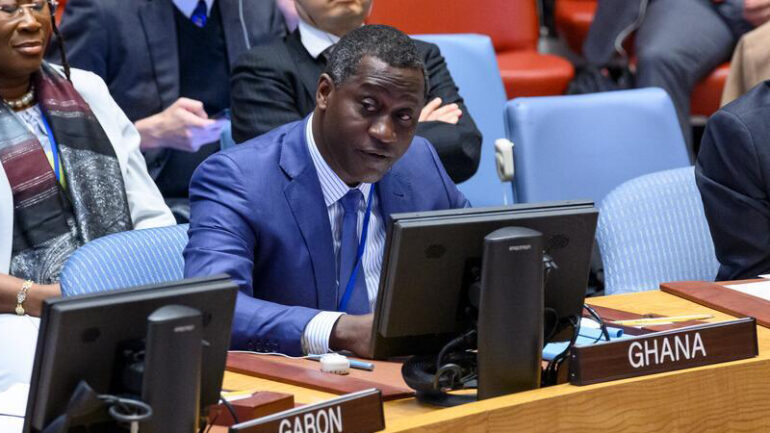UN Security Council Ministerial Open Debate on threats to International Peace and Security

H.E. Mr. Ramses Cleland,
Permanent Secretary for
Foreign Affairs and Regional
Integration of the Republic of Ghana.
December 07, 2023
MINISTERIAL OPEN DEBATE ON THREATS TO INTERNATIONAL PEACE AND SECURITY: TRANSNATIONAL ORGANISED CRIME, GROWING CHALLENGES, NEW THREATS
Mr. President,
Ghana would like to thank your delegation, Ecuador, for choosing to highlight during your Presidency of the Security Council this month, the significant and growing threat that transnational organized crimes pose for global peace and security.
We are grateful for the statement of the Secretary-General, His Excellency Mr. Antonio Guterres and extend appreciation for the briefings by Ms. Ghada Waly, Executive Director of UNODC and Professor Melani Cammett, Director of the Weatherhead Center for International Affairs at Harvard University.
Mr. President,
As the concept note for today’s meeting rightfully alludes, transnational organized crime, covering its wide array of illicit activities, is, on its own, a threat to the stability and development of any society. In its evolving form and by its interlocked actions with terrorism, violent extremism and maritime piracy, they pose an even more formidable menace to international peace and security through their cross-border impact.
In several parts of Africa, the Middle East, Latin America, Asia, and the Caribbean, we have witnessed the disastrous consequences that the looting of natural resources, the kidnapping of people, the illicit trade in small arms and light weapons, and the illicit narcotic trade have had on the capacity of States to hold their stability and sustain the peace.
We therefore welcome today’s open debate as an opportunity for the Council to reinforce concerted and collaborative global action to effectively address this pressing challenge, for a safer and more secure world.
We cannot continue to allow whole populations to be held to ransom, such as in Haiti; we cannot maintain ignorance of the effects that illicit trade of natural resources has had in destabilising States in the Great Lakes region; and we cannot refuse to act in reversing the cocktail of illicit cross-border activities that continue to fund violent extremism and terrorism in the Sahel as well as in the Horn of Africa.
As a Council, our responsibility, I believe, is to identify the gaps that allow such crimes to thrive and to galvanise global, regional and national actions in closing them, so as to safeguard the peace, enhance security, and through the upholding of the rule of law, create a conducive environment for sustainable development and global prosperity.
Mr. President,
In making Ghana’s contribution to today’s debate, I would like to highlight four main points.
First, in recognition of its convening power on thematic threats to international peace and security, the Council should seek to deepen its guidance to the broader United Nations system of the evolving threat and the required coordinated actions necessary to address the phenomena. This would require, besides such high-level debates and products to set out the Council’s thinking on the challenges and the way forward, encouragement for the provision of technical assistance to States in need, enforcement of compliance with sanctions regimes, and the facilitation of international cooperation. The Council can certainly foster collaboration, advance international norms, and help mobilise the necessary resources to combat this threat.
Secondly, technological advancements have provided both opportunities and challenges in the fight against criminal networks. While criminals exploit technology to engage in cybercrime, money laundering, and drug trafficking on a transnational scale, States, united by our common resolve, can turn the tide by harnessing these same technologies to detect, investigate, and prosecute such unlawful activities. By pooling our resources together and leveraging technology, we can stay a step ahead of criminals through a strengthening of cyber defenses, the responsible use of artificial intelligence for data analysis and predictive policing, and the promotion of digital literacy to prevent and reduce online crimes.
Thirdly, in addressing transnational organized crime, it is imperative to be gender-sensitive and to recognize the distinct impact of the consequences of such illicit activities on women and girls, who are often victims. By adopting a comprehensive and gender-sensitive approach, we can help provide accessible and effective support services tailored to the specific needs of this vulnerable group, especially in response to trafficking, sexual exploitation, and gender-based violence. This approach should also empower young people, including young women, to prevent such crimes and promote community resilience.
Empowering women and young people and promoting their active participation in law enforcement and judicial systems would also help strengthen national responses and address the root causes of these crimes. This inclusive approach is essential for safeguarding both those who have fallen victim to transnational organized crime and those who are susceptible to becoming victims.
Fourthly, international and regional cooperation is crucial in addressing the cross-border challenges posed by transnational organized crime. Strengthening information-sharing mechanisms, facilitating mutual legal assistance, and conducting joint operations and investigations among law enforcement agencies and judicial systems are key to dismantling criminal networks. By enhancing intelligence-sharing, bolstering law enforcement capabilities, and fostering international cooperation, we can effectively disrupt and dismantle transnational criminal networks. This collaborative approach will also allow for addressing underlying issues such as corruption and weak governance, thereby reducing vulnerabilities that criminals exploit.
Mr. President,
I would like to conclude with the words of my compatriot, Mr. Kofi Annan, former UN Secretary-General, he once said: “We may come from different corners of the world, our skins may vary in colour, our languages may be different, but our destinies are tied together.”
Mr. Annan’s profound statement still resonates today and reminds us of our collective responsibility as global citizens to disrupt these criminal networks and build a safer, more secure world for all.
I thank you for your kind attention.
